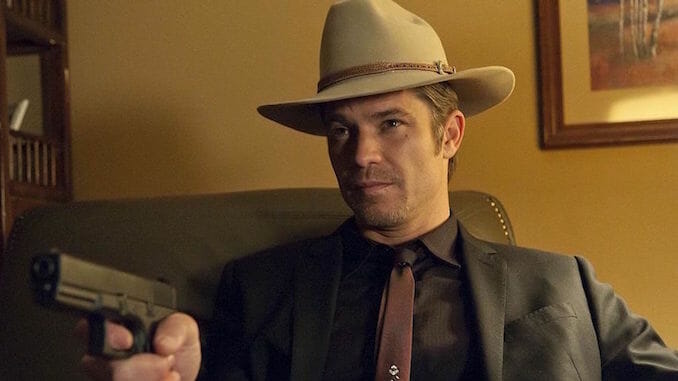Revisiting Raylan Givens, the Morally Compromised Lawman of Justified
Photo Courtesy of FX
There are some television shows that, when you first watch them, feel like they were tailor-made for you. FX’s neo-Western Justified, which is based on a short story by esteemed crime fiction writer Elmore Leonard, was that series for me. Debuting in 2010, the Kentucky-set drama stars perennial-portrayer of lawmen Timothy Olyphant as the quick-drawing, quick-tempered Deputy U.S. Marshal Raylan Givens. Walton Goggins also makes a star-turn as the clever and charismatic outlaw and thorn in his side Boyd Crowder. After the first few episodes I was hooked: drawn in by Raylan and Boyd’s shared history (which added a layer of complexity to the dance they were doing); the sharp, witty dialogue that flowed between them like the best Kentucky bourbon; the unique setting that is rarely seen on TV except as the stereotypical butt of a joke. For six seasons, Justified was my favorite show on television, and the morally compromised men at its center were my favorite topic of discussion.
In the years since Raylan put Boyd in prison and buried his personal demons in Kentucky, I have rewatched Justified a few times, even once cheekily writing about how it was the best show I watched in 2018, three full years after it ended. But as more time passes, watching Justified brings with it a sort of reckoning, as I am forced to contend with the fact that one of my all-time favorite shows—and one that I still believe in many ways is one of the best shows of the recent prestige era—depicts and thus contributes to a serious systemic issue in the real world: lawmen who believe they’re above the law using excessive force without worry, because they know they can get away with it.
Raylan’s frequent flouting of the law, disobeying direct orders, and shooting bad guys is baked into the very foundation of Justified. The show literally opens with him shooting a man on a crowded rooftop in Miami after giving said man 24 hours to leave town. It seems cool at first, and is more than effective at introducing viewers to the character and his point of view. But the excuse Raylan gives, when questioned by his boss, is that the shooting was justified because the man pulled on him first. Rather than being fired or stripped of his duties for a reckless use of lethal force in a public space again (it’s already a recurring issue for him), he is treated more like a PR disaster and sent back home to Kentucky, a place he never wanted to return to. And that’s the crux of the problem: Most of Raylan’s shootings—and there are many over the course of the show—probably are considered legal or “acceptable” because the person in question pulled on him or attacked him first. But how many times did he maneuver those people into that position or force their hand? How many encounters could have been handled differently, without the use of lethal force?
While Raylan isn’t a corrupt lawman in the traditional sense, one of the show’s running themes is that he could have been a criminal or outlaw like Boyd if the circumstances had been slightly different. The two grew up together in the same small town. They both had criminals for fathers. They dug coal together. But while Boyd followed in his dad’s footsteps in an attempt to make something of himself, Raylan hated his father and rebelled against his upbringing by joining law enforcement and helping to put away the types of men and women he encountered growing up. But his more respectable profession hasn’t fundamentally changed who he is. He’s still an angry man unable to face his trauma or deal with his emotional baggage, and who has—on more than one occasion—found himself spoiling for a fight, whether it was with a couple of drunks in a bar, or with Boyd (like when he tried to goad him into drawing on him in the series finale so he had a reason to shoot him). As righteous and well-intentioned as Raylan can be, and as many criminals as he has put away during his long career, Raylan’s flawed moral center and disregard for human life at times makes it difficult to ignore the real-world implications of depicting yet another white man sworn to uphold the law breaking it for his own benefit.
-

-

-

-

-

-

-

-

-

-

-

-

-

-

-

-

-

-

-

-

-

-

-

-

-

-

-

-

-

-

-

-

-

-

-

-

-

-

-

-








































